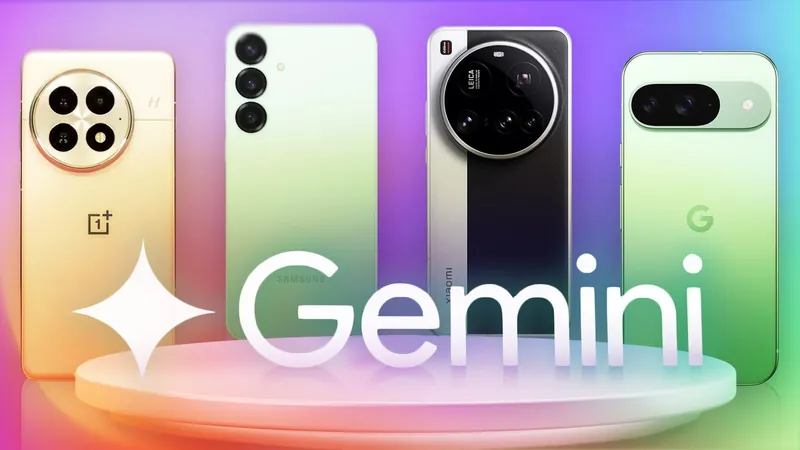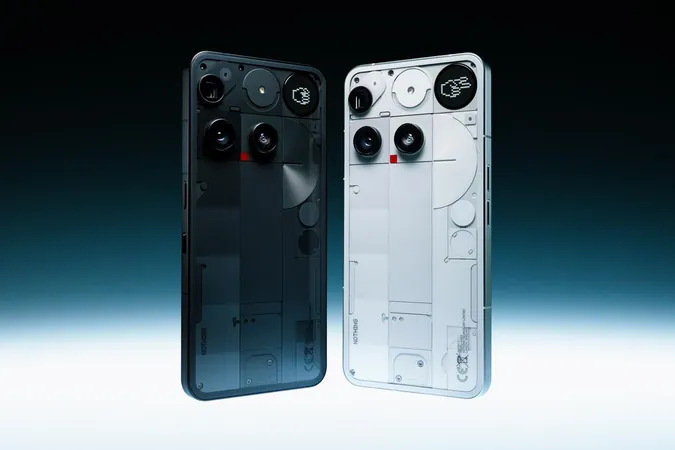
Are Android Phones Becoming the New Bloatware with AI Features?
2025-07-17
Author: Daniel
The AI Revolution in Android Phones
If you've recently purchased an Android device, you've probably noticed it bursting with AI capabilities. Whether you anticipated these features or were taken aback, it’s clear that AI has become a major selling point for manufacturers.
Is AI the Modern-Day Android Bloatware?
For instance, owning a Samsung Galaxy S25 gives you access to an array of AI utilities like Gemini, Circle to Search, Bixby, and Galaxy AI—all before even downloading popular apps like ChatGPT. This scenario harkens back to the early days of Android when manufacturers inundated devices with their own apps in a bid to stand out. The question arises: Is AI just another form of bloatware?
Why Phone-Makers Are Betting on AI
Android manufacturers recognize that with most flagship phones sharing similar high-end specs—like Qualcomm's Snapdragon chips, top-tier cameras, and robust battery life—the potential for AI to differentiate their products seemed promising. However, the reality tells a different story.
Research shows consumers are prioritizing factors like price, battery longevity, storage, and camera quality—just as they have for years—over shiny new AI features.
The AI Differentiation Dilemma
Despite manufacturers’ excitement, AI isn’t delivering the novelty they expected. Most Android devices leverage Google’s AI technology through its Gemini platform, which makes it challenging for companies to establish a distinct AI identity. While every phone-maker introduces a unique spin on AI, the result often resembles a patchwork of gimmicky features rather than cohesive innovations.
Samsung's Early Advantage with Galaxy AI
Among Android makers, Samsung has positioned itself well by launching Galaxy AI in January 2024, giving it a head start. Recent reports show that 70% of Galaxy S25 users are engaging with Galaxy AI features, but interestingly, many features like Circle to Search originated from Google. This strategic relationship with Google means that Samsung's innovations may quickly become available on other devices, including Google's own.
Google's Dominance in AI Tools
According to analysts, Google views Gemini as a crucial part of its future strategy. With its immense resources and market reach, Google is poised to dominate the AI landscape on Android devices. Samsung's 400 million devices, while impressive, pale in comparison to Google’s wider ecosystem.
The Rise of Unique AI Integrations
Despite the challenges, brands like OnePlus are rolling out their own AI solutions. Recently, OnePlus introduced features like a photo tool and Plus Mind, a content hub designed to help manage vital information. Their strategy reflects a keen awareness of the need to innovate while enhancing Google’s capabilities.
Nothing's Innovative Approach
A noteworthy player in this arena is the UK-based company Nothing, which is carving out a niche with a focus on unique design and utility rather than following the AI mainstream. Their innovative "Essential Space" feature showcases a commitment to being distinct and adaptable in AI.
Navigating the AI Landscape
As technology evolves, the pathway for Android manufacturers might become increasingly arduous. The competition will likely continue to boil down to Google versus Apple, with differentiation manifesting primarily between Google’s Gemini and Apple Intelligence. Until manufacturers discover ways to create truly unique AI experiences, they may struggle to convince consumers that their offerings are genuinely superior.


 Brasil (PT)
Brasil (PT)
 Canada (EN)
Canada (EN)
 Chile (ES)
Chile (ES)
 Česko (CS)
Česko (CS)
 대한민국 (KO)
대한민국 (KO)
 España (ES)
España (ES)
 France (FR)
France (FR)
 Hong Kong (EN)
Hong Kong (EN)
 Italia (IT)
Italia (IT)
 日本 (JA)
日本 (JA)
 Magyarország (HU)
Magyarország (HU)
 Norge (NO)
Norge (NO)
 Polska (PL)
Polska (PL)
 Schweiz (DE)
Schweiz (DE)
 Singapore (EN)
Singapore (EN)
 Sverige (SV)
Sverige (SV)
 Suomi (FI)
Suomi (FI)
 Türkiye (TR)
Türkiye (TR)
 الإمارات العربية المتحدة (AR)
الإمارات العربية المتحدة (AR)